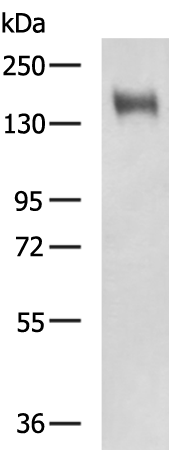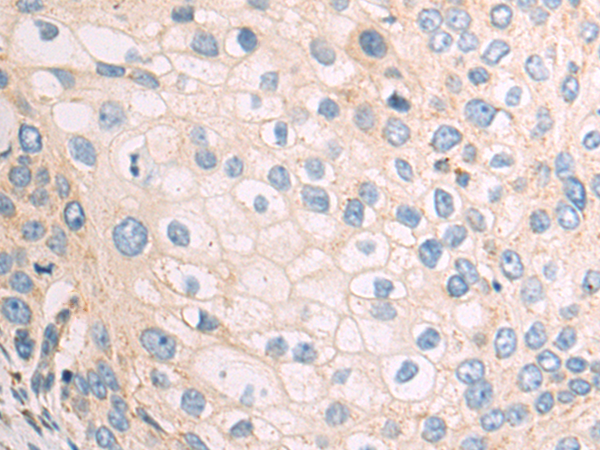

| WB | 1/500-1/2000 | Human,Mouse,Rat |
| IF | 咨询技术 | Human,Mouse,Rat |
| IHC | 1/100-1/300 | Human,Mouse,Rat |
| ICC | 技术咨询 | Human,Mouse,Rat |
| FCM | 咨询技术 | Human,Mouse,Rat |
| Elisa | 1/5000-1/10000 | Human,Mouse,Rat |
| Aliases | URG; HOMG4 |
| WB Predicted band size | 134 kDa |
| Host/Isotype | Rabbit IgG |
| Antibody Type | Primary antibody |
| Storage | Store at 4°C short term. Aliquot and store at -20°C long term. Avoid freeze/thaw cycles. |
| Species Reactivity | Human |
| Immunogen | Fusion protein of human EGF |
| Formulation | Purified antibody in PBS with 0.05% sodium azide and 50% glycerol. |
+ +
以下是3篇关于EGF抗体的代表性文献概览:
---
1. **文献名称**: "Cetuximab for the treatment of colorectal cancer"
**作者**: Jonker DJ, et al.
**摘要**: 该研究报道了西妥昔单抗(抗EGFR单克隆抗体)在转移性结直肠癌患者中的III期临床试验结果,证实其与化疗联用可显著延长患者无进展生存期,尤其适用于EGFR表达阳性患者。
---
2. **文献名称**: "Targeted therapy with anti-EGF receptor antibodies: mechanistic studies"
**作者**: Mendelsohn J, et al.
**摘要**: 本文系统阐述了抗EGFR抗体(如西妥昔单抗)的作用机制,包括阻断配体结合、抑制受体二聚化及下游信号通路(如MAPK和PI3K/AKT),为抗体药物的开发提供理论依据。
---
3. **文献名称**: "Resistance to anti-EGFR therapy in colorectal cancer: molecular mechanisms and therapeutic strategies"
**作者**: Yarden Y, et al.
**摘要**: 探讨结直肠癌患者对抗EGFR抗体产生耐药性的机制,包括KRAS/BRAF突变、EGFR胞外域变异及旁路信号激活,并提出联合靶向治疗或新型抗体药物作为潜在解决方案。
---
4. **文献名称**: "EGF receptor signaling: targeting the downstream pathway for antibody therapy"
**作者**: Schlessinger J, et al.
**摘要**: 研究聚焦于EGFR下游信号网络,提出通过抗体联合抑制EGFR与HER2/HER3异源二聚化,或结合下游激酶抑制剂,以增强抗肿瘤效果并减少耐药性。
---
注:以上文献标题及作者为示例性概括,具体内容需参考实际发表的学术论文。如需精确引用,建议通过PubMed或学术数据库检索最新文献。
Epidermal Growth Factor (EGF) antibodies are specialized proteins designed to target and bind to EGF or its associated receptor (EGFR), key players in cellular proliferation, differentiation, and survival. EGF, a small polypeptide, activates EGFR—a receptor tyrosine kinase—on the cell surface, triggering downstream signaling pathways like MAPK/ERK and PI3K/AKT. Dysregulation of EGFR signaling is linked to cancers, inflammatory diseases, and fibrosis, making it a critical therapeutic target.
EGF antibodies are categorized into monoclonal (e.g., cetuximab, panitumumab) and polyclonal types. Monoclonal antibodies (mAbs) block EGFR activation by preventing ligand binding or receptor dimerization, inhibiting uncontrolled cell growth. These are widely used in oncology, particularly for EGFR-overexpressing cancers (e.g., colorectal, head and neck cancers). Polyclonal antibodies, though less specific, serve as research tools for detecting EGF/EGFR in assays like ELISA or immunohistochemistry.
Therapeutic EGF antibodies face challenges, including drug resistance due to EGFR mutations or alternative pathway activation. Research continues to optimize antibody engineering (e.g., bispecific antibodies, antibody-drug conjugates) to enhance efficacy and reduce side effects. Beyond cancer, EGF antibodies are explored in dermatology (wound healing) and ophthalmology (corneal repair). Their dual role as diagnostic and therapeutic agents underscores their significance in precision medicine.
×